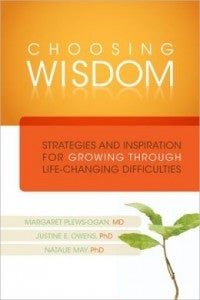Public Television Documentary & Book
Overview
The Wisdom Through Adversity researchers based at the University of Virginia are studying individuals who suffer from chronic pain and physicians who have been involved in a serious medical error, in an effort to understand the path through adversity to wisdom. These groups represent highly challenging yet very different circumstances.
Please explore the results of our work through the resources here. They offer sources of inspiration for anyone facing their own difficult journey and for those who seek to aid them along the way.
Public Television Documentary
Choosing Wisdom: The Path Through Adversity, a documentary exploring the themes of our work, premiered on National Public Television in 2012. The film highlights just a few of the individuals we discovered who found creative, meaningful and wise ways to move through their most difficult struggles. We hope to show that ordinary people in difficult circumstances can respond to adversity in a way that leaves the world a better place. By showing people who have struggled, we hope to soften the world, creating in viewers a more compassionate and less judgmental view of themselves and others. We also hope to foster curiosity about wisdom and, ultimately, to assure viewers (like you) that, if faced with adversity, you too can survive and even flourish. Positive growth is accessible to everyone.
For Physicians: 40 Minute Documentary
For Physicians: Short Teaching Sessions
For Patients: 40 Minute Documentary
For Patients: 40 Minute Documentary
Resources and Book
Resources
Book
 Choosing Wisdom: Strategies and Inspiration for Growing Through Life-Changing Difficulties
Choosing Wisdom: Strategies and Inspiration for Growing Through Life-Changing Difficulties
Plews-Ogan M, Owens JE, May N. Templeton Press, 2012.
Available at online booksellers.
Featured at the 2013 Virginia Festival of the Book.
“A must-read for medical professionals, patients, and anyone interested in cultivating their own self-awareness and appreciation of our deep connections to the sufferings and joys of our fellow human beings.”
Richard M. Frankel, Professor of Medicine and Geriatrics, Indiana University School of Medicine
